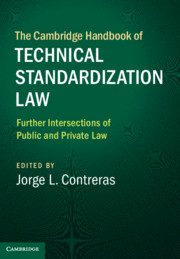 The Cambridge Handbook of Technical Standardization Law
The Cambridge Handbook of Technical Standardization Law Book contents
- The Cambridge Handbook of Technical Standardization Law
- The Cambridge Handbook of Technical Standardization Law
- Copyright page
- Contents
- Figures
- Tables
- Contributors
- Preface
- Acknowledgements
- Introduction
- PART I Standardization and the State
- PART II Standardization, Health, Safety and Liability
- PART III Copyright and Standards
- 5 Questioning Copyright in Standards
- 6 Integrating Technical Standards into Federal Regulations: Incorporation by Reference
- 7 Public Law, European Constitutionalism and Copyright in Standards
- 8 Termination of Copyright Transfers and Technical Standards
- PART IV Standards and Software
- PART V Trademarks, Certification and Standards
- References
- Index
8 - Termination of Copyright Transfers and Technical Standards
from PART III - Copyright and Standards
Published online by Cambridge University Press: 04 September 2019
- The Cambridge Handbook of Technical Standardization Law
- The Cambridge Handbook of Technical Standardization Law
- Copyright page
- Contents
- Figures
- Tables
- Contributors
- Preface
- Acknowledgements
- Introduction
- PART I Standardization and the State
- PART II Standardization, Health, Safety and Liability
- PART III Copyright and Standards
- 5 Questioning Copyright in Standards
- 6 Integrating Technical Standards into Federal Regulations: Incorporation by Reference
- 7 Public Law, European Constitutionalism and Copyright in Standards
- 8 Termination of Copyright Transfers and Technical Standards
- PART IV Standards and Software
- PART V Trademarks, Certification and Standards
- References
- Index
Summary
In 1938 Jerry Siegel and Joseph Shuster, the creators of the Superman comic book character, sold their copyright to the predecessor of DC Comics for $130. Siegel and Shuster died in the 1990s, virtually penniless, while Superman earned heroic sums for his corporate owners over many decades. Similar scenarios have arisen for literary authors, songwriters, and visual artists. In each case, young and unknown creators, eager to secure their first commercial contract, sell their rights in important early works to a publisher or record label for a pittance, and are then unable to profit from the work’s later success.
- Type
- Chapter
- Information
- The Cambridge Handbook of Technical Standardization LawFurther Intersections of Public and Private Law, pp. 143Publisher: Cambridge University PressPrint publication year: 2019
